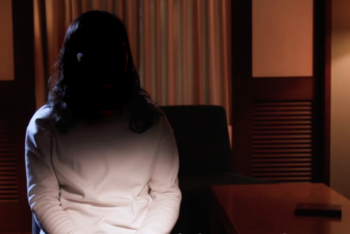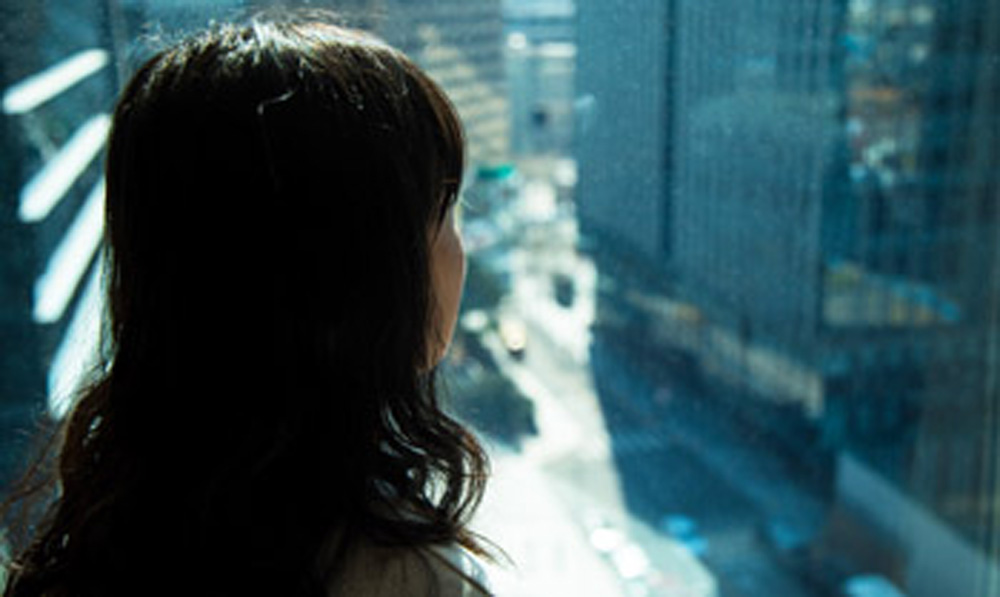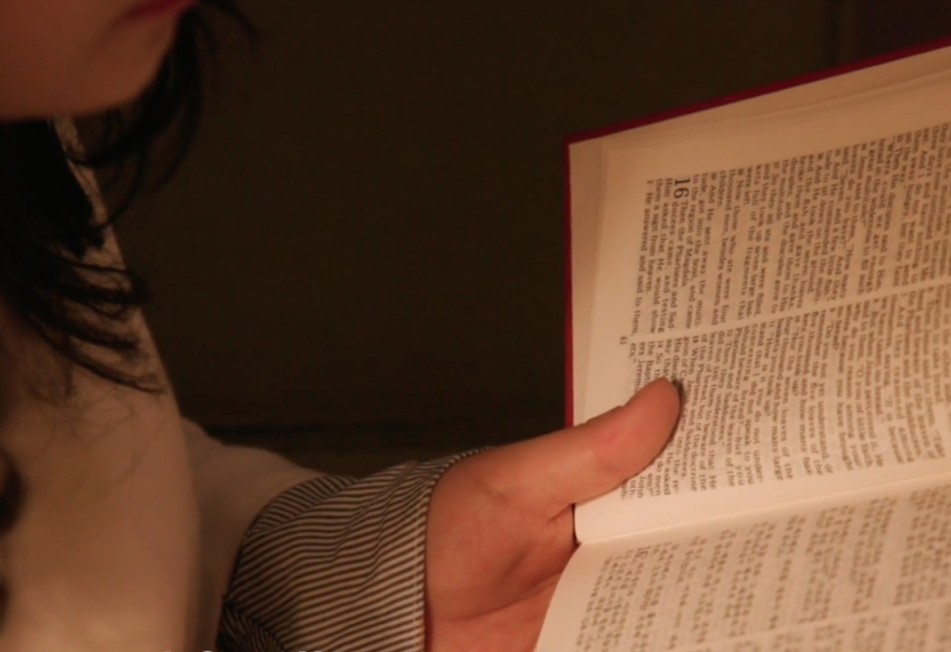Eun Hye closed the bathroom stall door. She was now in the safest and dirtiest place in

the kotjebi camp for North Korean street children.
Her parents and sisters were in China. Her brother was with an uncle in North Korea. Months earlier, she also stayed with her uncle—until there wasn’t enough food for all of them. That’s when Eun Hye, 16 at the time, decided to leave and turned to the streets so her little brother would survive.
Only a few weeks later, she was caught by the police and brought to a camp for street kids. It was a crowded place with over 2,000 children. There wasn’t even enough room to sit. She had to stand day and night, which made her legs swell up. For food, she received five tiny dirt-covered potatoes three times a day.
With no opportunity to wash themselves, the children’s bodies were filthy and tormented by maggots. Every day, children passed away because of the malnutrition.
In the quiet of the stall, Eun Hye remembered the prayers of her grandmother. Could this invisible God save her? she thought. She remembered the way her grandmother would secretly find a place to kneel and speak to the one she called “Hanonim,” which means Lord.
Eun Hye whispered the words she had heard her grandmother whisper on so many occasions before. “Hanonim, please save me. Please rescue me. Bring me back to my family,” she said with the quiet voice of a 16-year-old girl.
In this place, nobody wanted to go to the bathroom unless they had no choice. But Eun Hye came to appreciate those precious moments alone with the God of her grandmother. “Lord, save me from this pain, sadness and death,” she would repeat in the quiet of the bathroom stall.
Two months after her arrival in the camp, the guards asked for volunteers to collect chestnuts by climbing up trees in the mountains. It meant a long, difficult journey. Eun Hye and the other children were very weak and she had no intention of participating in what could become a walk of death. But then she heard a voice in her head she didn’t recognize that told her to volunteer. So she joined the group.
Crossing the reservoir
On the journey, they had to cross a large reservoir with small boats. Then she was placed in a unit of four children. Two climbed up the trees to pick the chestnuts, while two others stayed down to collect them.
Eun Hye saw this as an opportunity to attempt an escape with another girl in her group. “Can you swim?” Eun Hye asked. The girl shook her head. Once again, Eun Hye prayed for help.
Later, when no one was around, Eun Hye and her friend escaped and found a rope at a nearby house. When they arrived at the reservoir, the girls tied the rope around their waists. The girl would try to float, while Eun Hye used all the strength she had to swim to the other side, dragging her friend through the water.
They reached the shore safely and walked all the way to the city. Afraid they would be caught again, they decided to board a train. Because they didn’t have train tickets nor travel permits, they dug a hole under the wall with their bare hands and accessed the railway track. Once they were through, they went their separate ways.
Eun Hye went back to her hometown to see if there was any word of her parents or siblings. She found neighbors and strangers who helped give her a little food to survive. Again she prayed, “God, I have no place to go. My future looks so bleak. Please guide me.”
Eventually, the family of a nearby farmer took her in. At least she was safe for a while. Now her prayers shifted from survival to finding her family: “Thank you, Lord, for what you’ve done for me. May I please continue to live here? And please help me find my family.”
One day, a family friend contacted Eun Hye. “Your father is with us,” they said. “And your brother too.”
She ran to see her father and brother. She was elated at the answer to her prayer. Eventually, she asked, “How is mother?”
“Your mother is fine. And your sisters too,” her father said. “They are married in China. Life is so much better [there].”
Upon hearing his words, Eun Hye made up her mind to escape North Korea and return to China with her father and brother.
Passage into China
They went to the river at night. Her father tied her little brother to himself with a rope and made sure both of them arrived at the other side safely. Eun Hye swam on her own. Behind her, North Korea was pitch black. The Chinese city in front of her burst with lights.
When they finally reunited with her mother and other siblings, they celebrated. Eun Hye told her mother about her prayers in North Korea. She quickly noticed her father had told the truth about the living standards. There were no street children, no blackouts, every household ate rice, and everyone was friendly.

That Sunday, Eun Hye went to church with her mother. For the first time in her life, she saw the cross on the wall. And she could see other people praying. They prayed with the same gestures and the same words as her grandmother had, so many years ago.
She didn’t understand the Chinese sermon, but she felt at home. She realized that the prayers of her grandmother, of her mother, of her father and the prayers of the church allowed her to make it safely to China.
“I was so thankful for their prayers. Later, a translator explained more about God to me. [How] Jesus had died and was resurrected to cleanse us of our sins,” Eun Hye says.
Back into North Korea
All North Korean refugees are at risk of being caught in China and sent back to their homeland. And eventually, someone reported Eun Hye’s family to the officials. Shortly after, her parents, her brother and Eun Hye were arrested. Eun Hye cried when they were driven to a bridge connecting China to North Korea. Her parents were shackled together. Eun Hye, almost 17, and her 13-year-old brother were shackled as well.
In North Korea, they were transported to a detention center near her hometown. Her mother and Eun Hye were put in a women’s cell; her father and brother in cell with other men. It was winter, and the outside temperatures had dropped. Eun Hye wasn’t wearing winter clothes. Soon, her feet began to hurt and turned black. Frostbite. The prison doctor said that her feet may have to be amputated.
But that wasn’t the worst part. Soon, the interrogations began. Each family member was questioned individually. The guards brought out a phone. “Where are your older sisters?” they shouted. “Are they in China?” Eun Hye refused to answer. “We can make a call and bring them here if you don’t tell us where they are!” the guards said.
Eun Hye’s parents were put in solitary confinement and tortured. Where she was she could hear their screams. “Why is it a crime to believe in God?” her father asked his tormentors. He said that he would continue to believe and pray, even in prison. Then the guards dragged her unconscious mother in front of Eun Hye’s cell. She was beaten so badly Eun Hye hardly recognized her. “You will end up like her if you continue to lie!” they warned her.
Eun Hye wanted to scream and cry, but she kept it all inside. Crying wasn’t allowed and would mean more punishment. She couldn’t do anything for her mother. Minutes later, the security agents dragged away her mother’s body, back to her own cell.
Each day was a struggle to survive. Her feet hurt so much that in the five hours she was allowed to sleep—from midnight to 5 a.m.—she couldn’t. Her meals consisted of a small portion of unwashed turnip greens. They tasted dirtier than anything she had ever eaten.
According to the leaders of North Korea, Eun Hye’s family had “problematic political beliefs” and were likely headed to one of the maximum-security gulags where they would work until they died. But Eun Hye’s parents didn’t give up. In the moments they were conscious and not tortured, they prayed.
Then, the impossible happened.
Eun Hye was taken out of her cell. Her brother, father and mother too. They were released. Nobody knew how or why. There was simply no explanation. It had to be God’s intervention.
Miracle at the river
Eun Hye and her brother brought their badly injured parents to their uncle’s house. They had no other place to go. After a few months, her mother had slightly recovered and Eun Hye’s frostbite had healed. Her father told Eun Hye to take her mother to China.
“Your uncle cannot take care of so many people. We only eat grass here. You have to go first with your mother. I’ll come with your brother as soon as I’m able,” he said.
Because her mother couldn’t swim, Eun Hye prepared another rope before they secretly went to the river. There were guards approximately every 300 feet. They chose a place between the guards. Both women prayed. Then Eun Hye led her mother into the water.
The current was stronger than expected, and the two drifted closer and closer to the guards. Eun Hye tried to swim faster, but swimming faster meant more noise. As they drifted close to the guards, her mother let out a scream. The guards jumped to attention and shouted at Eun Hye and her mother to get out of the water. Then the first bullet hit the water. And the second. And the third.
Eun Hye thought she would die there in the water, but she kept swimming. Only God decides if I will live or die today, she comforted herself. Somehow all the bullets missed and both she and her mother reached the Chinese shore.
Later, Eun Hye found out that her father passed away due to his injuries in the prison camp. Her brother is the only family member still in North Korea today. In the years that followed, Eun Hye married a kind-hearted Chinese man. But peace didn’t last long.
One day, “four police officers appeared at our house in the countryside,” Eun Hye says. “They knew where the North Korean women were hiding. They had been instructed to arrest North Korean women without a child.”
The unthinkable happened, and Eun Hye was arrested yet again.
“The only hope I had was that I’d see my brother again, if I survived. That was far from certain, however, and I considered smashing my head against the wall and killing myself,” she says.
“My husband could visit me once in the prison. He told me there was nothing he could do. I’d be sent back to North Korea. But then, the day the truck was supposed to come, a police officer asked me if I was pregnant. I wasn’t, but I knew I had to say yes. They had been instructed to arrest women without children. So I said I was carrying a baby, and they released me. It was another miracle. Out of 30 women, I was the only one released.”
Later, Eun Hye and her mother prayed that Eun Hye would have a baby girl. God answered their prayers and soon she was pregnant and gave birth to a daughter. When the child was three years old, Eun Hye’s husband allowed them to flee to South Korea.
One more crossing
A broker arranged transport to take all of Eun Hye’s family from China to Laos and then to Thailand. From Thailand, they would be sent to South Korea.
In Laos, they had to travel through the mountains by foot; a small boat took them into Thailand. Along the way, Christian missionaries helped them survive. “That was part of God’s work to keep us safe. We are eternally grateful for them,” Eun Hye says.
Finally, once they were in Thailand they reported themselves to the police, were put in jail as illegal refugees and then handed over to the South Korean authorities to be flown to South Korea. Her older sisters followed later. Now Eun Hye’s mother, two sisters, her daughter and Eun Hye herself live safely in South Korea.
With each river crossing and each miraculous escape from prison, God was with Eun Hye, transforming her life and growing her mustard-seed faith. What started as a memory of her grandmother’s prayer and her hopeful whisper in a bathroom stall became her lifeline she would choose to hold onto for the rest of her life. God was with her then as a scared 16-year-old girl—and now as a wife and mother living in South Korea.

Later when Eun Hye heard that so many people around the world had prayed for her—and the many Christians in North Korea who suffer today—she shared with us, “I had no idea so many people were praying for us. Those prayers are really important. They will lead more people to Jesus Christ in North Korea.”
When you think about Eun Hye’s miraculous journey, remember to pray for your sisters and brothers who suffer in North Korea at this very moment—and ask God to provide the help they need for His deliverance. – Open Doors
If you want to know more about a personal relationship with God, go here
How to pray:
Pray for the food crisis in North Korea. Church leaders tells us that the shortage is severe with many dying from starvation and illness.
The situation for Christians is vulnerable and precarious. They face persecution from state authorities and their non-Christian family, friends and neighbors. Pray for their protection.
Pray for strength and courage for Christians who suffer in prisons, labor camps and remote areas.
Pray that God will prepare the underground church in North Korea to be a light for the country—and that they will be ready to share the gospel freely someday soon.
For more information about the ministry of Open Doors in North Korea, go here



